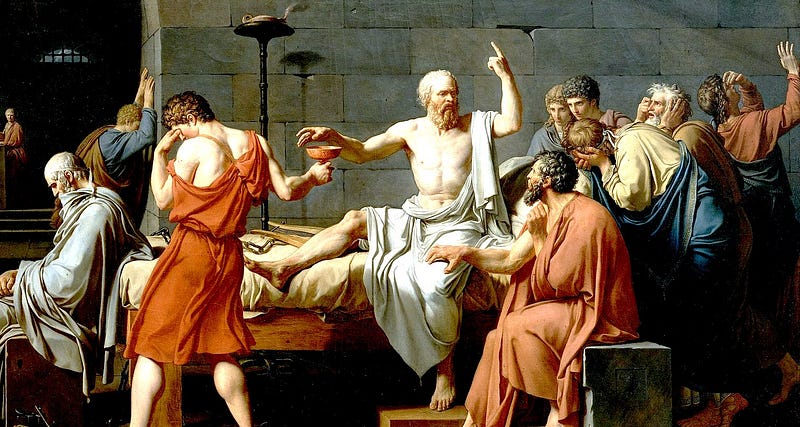Exploring Courage and Temperance Through Socratic Philosophy
Written on
Chapter 1: The Essence of Courage and Temperance
In Plato's dialogue, The Phaedo, Socrates engages his companions in a profound examination of virtues, particularly courage and temperance, as he faces his imminent death. This dialogue presents a compelling argument: true possession of these virtues is exclusive to philosophers. Socrates contends that the general understanding of courage and temperance is fundamentally flawed. This notion is not surprising, as Socrates himself acknowledges uncertainty regarding these concepts in dialogues such as Laches and Charmides.
According to Socrates, what many people label as courage or temperance is, in reality, a misrepresentation of these virtues. For instance, the so-called bravery of the masses often reveals itself to be a superficial form of cowardice. Similarly, what is perceived as temperance frequently manifests as indulgence or a lack of self-control. Socrates hints that this misunderstanding is not merely an oversight but a deeper misalignment in motivations that drive individuals to act.
Section 1.1: Philosophical vs. Non-Philosophical Courage
Socrates argues that non-philosophers tend to confront their fears, showing bravery in the face of danger. However, this bravery is often rooted in a fear of losing something they value more, such as wealth or reputation. Thus, the courage displayed is influenced by deeper anxieties, revealing a paradox where true courage becomes entangled with cowardice.
As Socrates points out, the courageous individual, particularly in contexts like battle, faces the fear of death—something inherently terrifying. Their motivation often stems from a fear of losing what they love, leading them to take risks not for the sake of virtue, but in pursuit of other desires. This dynamic raises questions about the nature of courage itself, as the fears that underlie their actions often dominate their decision-making.
Subsection 1.1.1: The Role of Fear in Courage

Section 1.2: Philosophical vs. Non-Philosophical Temperance
Socrates employs a similar analysis with temperance, revealing that what is often regarded as moderation is, in fact, a façade. Most individuals exhibit temperance not out of a genuine understanding of its value, but as a strategy to preserve greater pleasures. Socrates suggests that their so-called moderation is frequently a cover for deeper self-indulgence.
For example, individuals might exercise restraint over lesser desires to secure enjoyment from what they deem more significant pleasures. This behavior illustrates a flawed understanding of temperance, as it stems from an underlying lack of control rather than genuine self-discipline. Thus, the superficial practice of temperance is often intertwined with its opposite.
Chapter 2: The Exchange of Virtue
In exploring these virtues, Socrates introduces the concept of motivation as a form of exchange. For non-philosophers, the currency involved in this transaction is often linked to emotional responses—pleasures and pains, fears and desires. Conversely, philosophers engage in a different exchange, one that is oriented towards wisdom.
Philosophical courage and temperance are characterized by a clarity of purpose, untainted by the fears that undermine the courage of non-philosophers. Wisdom serves as the guiding principle that transforms these virtues into their purest forms, allowing for a genuine embodiment of courage and temperance devoid of cowardice or indulgence.
In essence, Socrates posits that true temperance and courage involve a cleansing from the emotional tumult that clouds judgment, distinguishing them from the corrupted versions prevalent among the masses. This philosophical perspective invites deeper contemplation on the nature of virtue and the motivations that underpin our actions.
By examining these concepts, we can better understand the path to genuine self-improvement and the role that wisdom plays in shaping our understanding of courage and temperance.